
Find Help
More Items From Ergsy search
-
Is malaria still a concern for blood transfusion safety?
Relevance: 100%
-

What diseases can be spread by blood transfusions?
Relevance: 65%
-
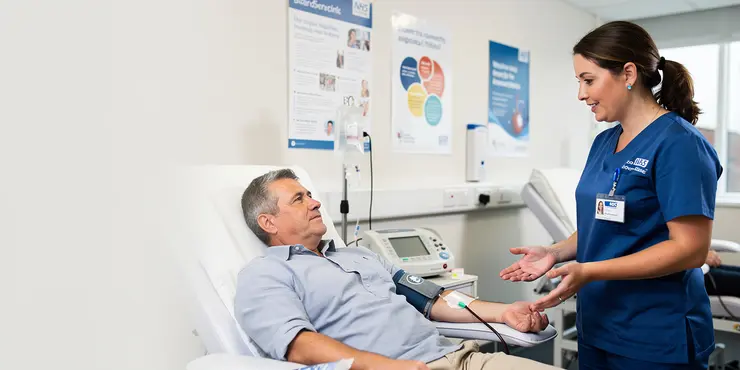
Are there any parasites that can be transmitted through blood transfusions?
Relevance: 65%
-
What is a blood transfusion?
Relevance: 57%
-
Blood Product Transfusions
Relevance: 57%
-
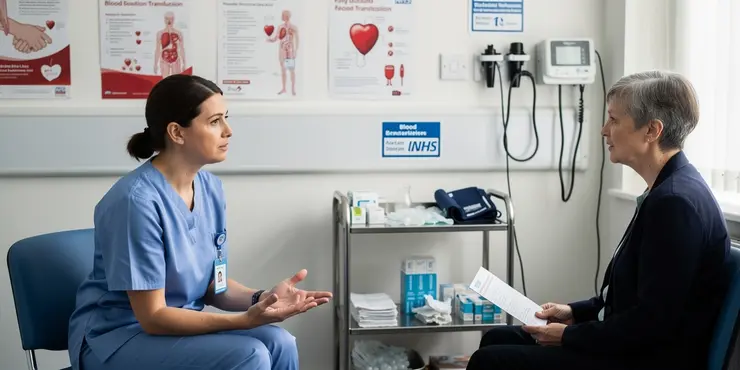
Is HTLV a risk in blood transfusions?
Relevance: 55%
-
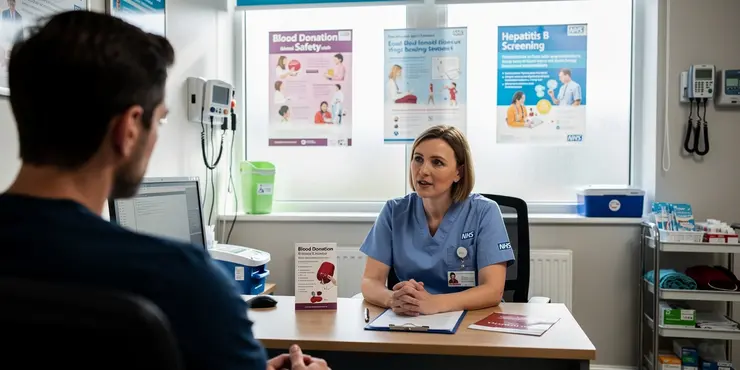
Is Hepatitis B a risk in blood transfusions?
Relevance: 55%
-

Are there risks associated with blood transfusions?
Relevance: 54%
-
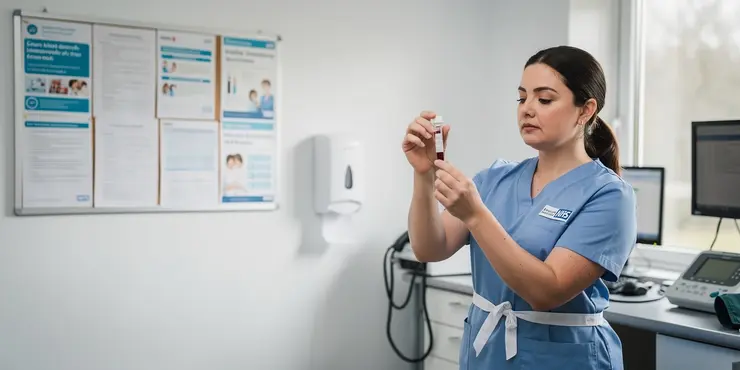
What is the most common disease transmitted by blood transfusion?
Relevance: 54%
-
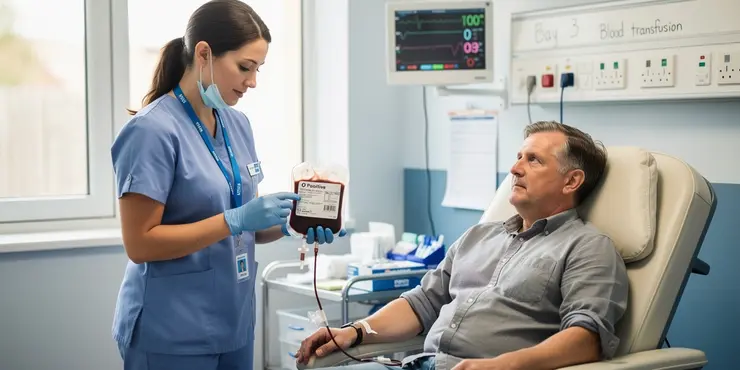
Blood Transfusion
Relevance: 54%
-
Is there an age limit for receiving blood transfusions?
Relevance: 53%
-
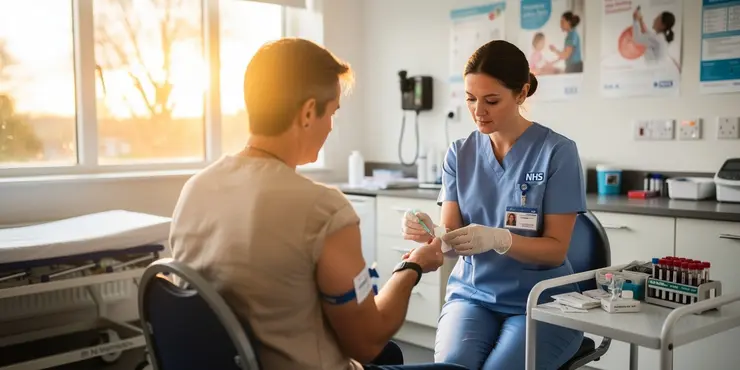
Is Chagas disease a concern with blood transfusions?
Relevance: 52%
-
Is Zika virus screened for in blood transfusions?
Relevance: 51%
-
Can someone have a reaction to a mismatched blood transfusion?
Relevance: 51%
-
How long does a blood transfusion take?
Relevance: 50%
-
Can bacterial infections be transmitted through blood transfusion?
Relevance: 50%
-
Are new emerging pathogens a risk for blood safety?
Relevance: 50%
-
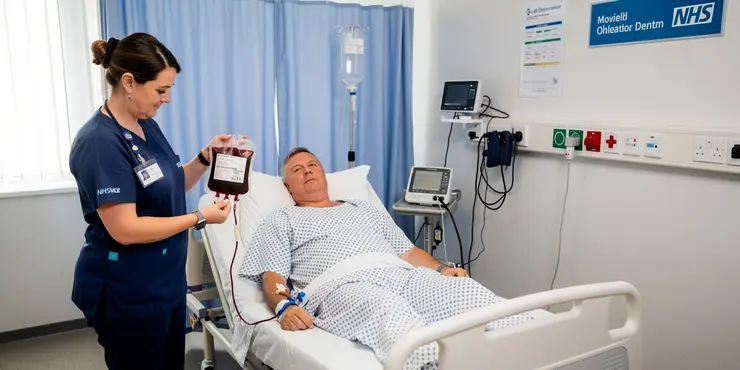
What types of blood products can be transfused?
Relevance: 50%
-

Can syphilis be transmitted via blood transfusion?
Relevance: 50%
-
Can HIV be transmitted through blood transfusions?
Relevance: 49%
-
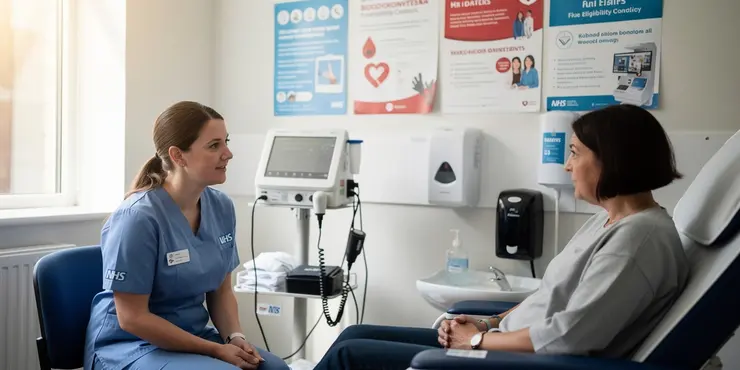
Can COVID-19 be transmitted through blood transfusions?
Relevance: 49%
-
What are some common reasons blood transfusions are needed?
Relevance: 48%
-
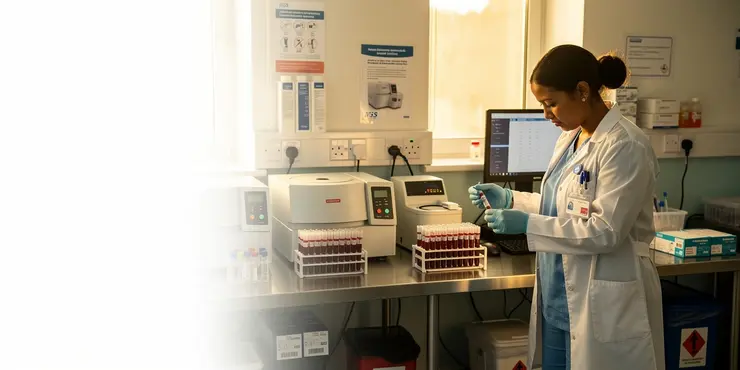
How do healthcare providers match blood for transfusions?
Relevance: 47%
-
Why might someone need a blood transfusion?
Relevance: 47%
-
Can Dengue fever be transmitted through blood transfusions?
Relevance: 47%
-
Can you get any prion diseases from blood transfusion?
Relevance: 47%
-

What measures are taken to prevent disease transmission in blood transfusions?
Relevance: 47%
-
Can people of any blood type receive a transfusion of any blood type?
Relevance: 47%
-

How do doctors determine how much blood is needed for a transfusion?
Relevance: 46%
-
Can certain medical conditions prevent receiving blood transfusions?
Relevance: 44%
-
Is blood used for transfusions safe?
Relevance: 41%
-
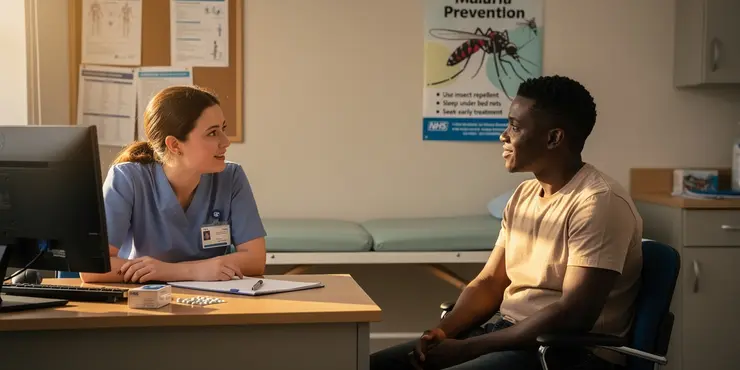
Is malaria spread by mosquitoes in the UK?
Relevance: 39%
-
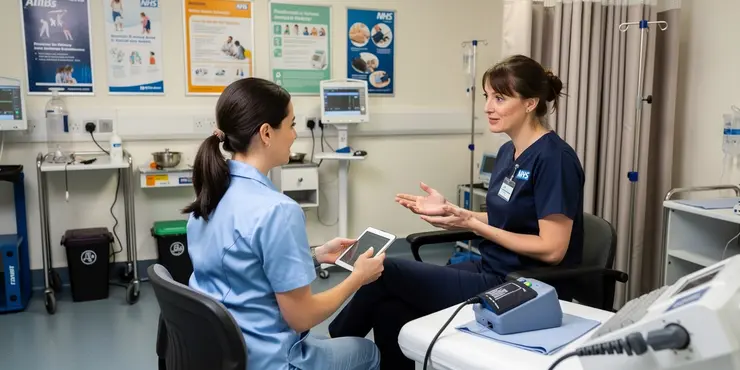
Are there global differences in screening for blood transfusions?
Relevance: 38%
-
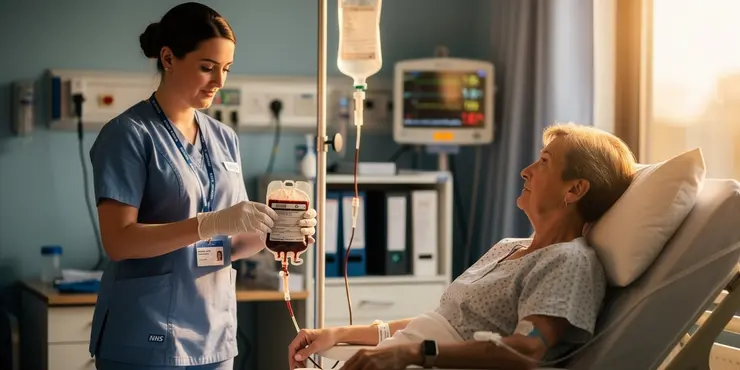
Can cytomegalovirus (CMV) be spread through transfusions?
Relevance: 38%
-
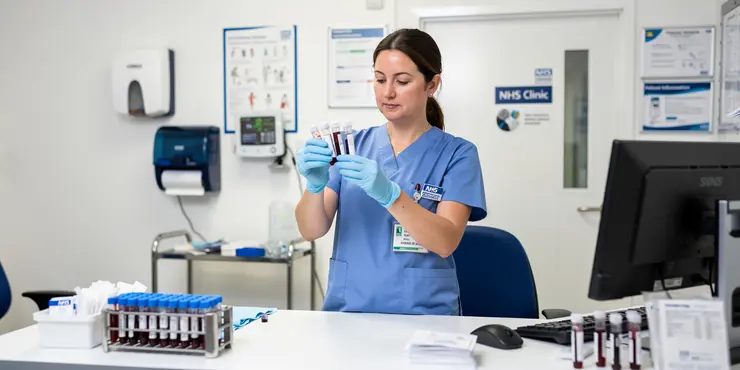
What other viruses are tested for in blood donations?
Relevance: 38%
-
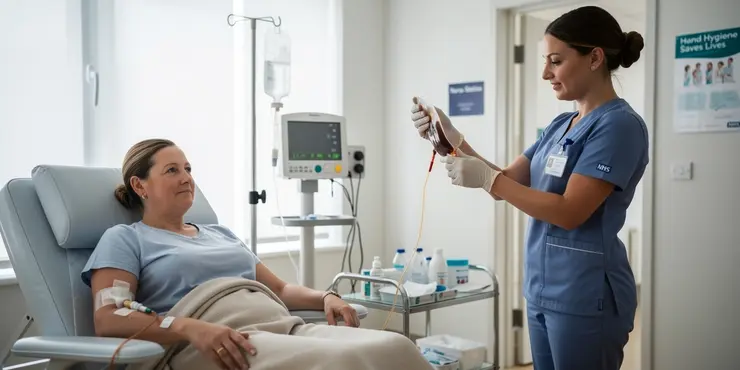
What is plasma, and why might it be transfused?
Relevance: 37%
-
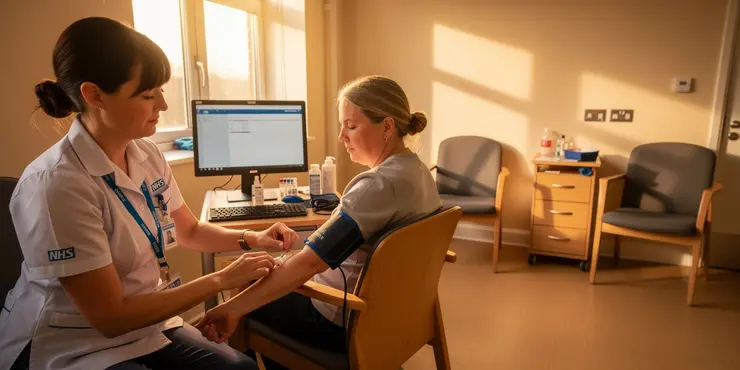
How is blood screened to prevent disease transmission?
Relevance: 36%
-
What kind of follow-up care is needed after a blood transfusion?
Relevance: 34%
-
What should a patient expect after a blood transfusion?
Relevance: 32%
-

How significant is the reduction in funding for AIDS, Tuberculosis, and Malaria research?
Relevance: 29%
Introduction
Malaria, a mosquito-borne infectious disease caused by Plasmodium parasites, remains a global health issue. While it is primarily a concern in tropical and subtropical regions, its potential impact on blood transfusion safety in non-endemic areas, such as the UK, makes it a topic of significance. Ensuring the safety of blood transfusions involves mitigating the risk of transmitting infections, including malaria, to recipients.
The Risk of Transmission through Blood Products
Malaria transmission through blood transfusion, though rare, is a documented risk. This risk arises when a blood donor, who may be asymptomatic, has Plasmodium parasites in their bloodstream at the time of donation. Unlike some other pathogens, malaria parasites can survive in stored blood products, making thorough screening and risk assessment crucial for blood transfusion services.
Screening Measures in the UK
The UK employs stringent screening measures to prevent malaria transmission through blood transfusions. Donors who have visited malaria-endemic regions are subject to deferral periods, typically ranging from several months to a few years. This deferral allows time for any potential infection to become apparent or clear naturally. Additionally, the UK Blood Transfusion Services frequently update their guidelines in response to changes in global malaria epidemiology, ensuring that screening processes are aligned with current risks.
Technological and Scientific Advances
Advancements in diagnostic technologies have enhanced the ability to detect Plasmodium parasites in blood donations. Molecular techniques, such as polymerase chain reaction (PCR), offer high sensitivity and specificity, allowing for the identification of low-level infections that might not be detected by traditional methods. However, such technologies are not routinely used for all donations due to cost and logistical considerations. They are typically reserved for cases where a higher risk of malaria is suspected.
Global Health and Travel Considerations
Globally, efforts to reduce malaria transmission focus on mosquito control, access to antimalarial medications, and vaccination development. These measures indirectly benefit blood transfusion safety by decreasing the overall prevalence of malaria. For the UK, as international travel becomes more frequent and expansive, travelers returning from affected areas are advised to follow public health guidelines to minimize the risk of introducing malaria into the non-endemic population.
Conclusion
While the direct threat of malaria transmission via blood transfusion in the UK is low due to comprehensive screening and deferral policies, it remains a concern due to global travel patterns and the persistence of malaria in many parts of the world. Continuous vigilance, advancements in screening technologies, and global cooperation in tackling malaria are essential components in maintaining the safety of the blood supply. Public awareness and adherence to health advisories can further help mitigate this risk.
Introduction
Malaria is a sickness you can get from mosquito bites. It is caused by tiny germs called Plasmodium. Malaria is mostly a problem in hot countries. But, it can also be a worry in places like the UK, especially when people need blood transfusions. A blood transfusion is when you get blood from another person. To keep this safe, we must make sure the blood does not have any infections, like malaria.
The Risk of Transmission through Blood Products
It is possible to get malaria from a blood transfusion, but this does not happen often. This can happen if a person giving blood has malaria germs in their blood, even if they do not feel sick. Malaria germs can stay alive in the blood used for transfusions. This is why blood donation places need to check the blood very carefully.
Screening Measures in the UK
In the UK, there are strict rules to make sure blood transfusions are safe from malaria. If someone has been to a country where malaria is common, they have to wait some time before they can give blood. This wait can be from a few months to a few years. This helps make sure they are not carrying malaria. Also, the UK updates their blood testing rules often, to keep up with new information about malaria.
Technological and Scientific Advances
New tools have been made to find malaria germs in blood better. Techniques like PCR (a special test) can find even tiny amounts of these germs. But these tests cost more money and take more time. They are used when there is a higher chance that someone might have malaria.
Global Health and Travel Considerations
Around the world, people are trying to stop malaria by controlling mosquitoes, giving out medicine, and working on vaccines. This helps make blood transfusions safer because fewer people have malaria. In the UK, people who travel to places where there is malaria need to follow health advice. This helps keep malaria out of the UK.
Conclusion
The chance of getting malaria from a blood transfusion in the UK is low. This is because the UK has good blood checking rules. But, because people travel a lot and malaria is still common in many countries, we need to keep being careful. New tests and working together globally help keep blood safe. People also need to listen to health advice to help keep the risk low.
Frequently Asked Questions
What is malaria?
Malaria is a disease caused by parasites transmitted to humans through the bites of infected female Anopheles mosquitoes.
Can malaria be transmitted through blood transfusions?
Yes, malaria can be transmitted through blood transfusions if the donated blood contains malaria parasites.
Is malaria a concern for blood transfusion safety?
Yes, malaria is still a concern for blood transfusion safety, especially in areas where the disease is endemic.
How do blood banks screen for malaria?
Blood banks screen donors through health questionnaires and may test at-risk samples using laboratory methods to detect malaria parasites.
Why is it important to screen blood for malaria?
Screening is crucial to prevent the transmission of malaria to recipients, who might become severely ill if they contract the disease.
What populations are at higher risk for donating blood with malaria?
People who have traveled to or lived in malaria-endemic regions are at higher risk for carrying malaria parasites.
What are the symptoms of malaria?
Symptoms of malaria include fever, chills, headache, muscle aches, and fatigue. Severe cases can cause anemia, jaundice, and can be life-threatening.
How is donated blood tested for malaria?
In some countries, donated blood may be tested for malaria using thick and thin blood smears or more advanced diagnostic tests like PCR.
Has the risk of malaria transmission through blood transfusion decreased?
The risk has decreased in many parts of the world due to better screening and malaria control measures, but it remains a concern in endemic areas.
What measures are in place in non-endemic countries to prevent malaria transmission via blood transfusion?
Non-endemic countries often defer donations from individuals who have recently traveled to or lived in malaria-endemic regions for a certain period.
Why might blood donations be deferred due to malaria risk?
To prevent the possible transmission of malaria to recipients, which would be a health hazard.
Can malaria be transmitted from person to person through casual contact?
No, malaria cannot be transmitted person-to-person through casual contact; it requires direct transfer of infected blood or a mosquito vector.
What are the global regions most affected by malaria?
Malaria is most prevalent in sub-Saharan Africa, parts of South Asia, Southeast Asia, Latin America, and some areas in the Middle East.
How long after potential exposure to malaria should a person defer blood donation?
Policies vary, but many blood donation organizations recommend deferral for one year following travel to or residency in a malaria-endemic area.
What is the incubation period for malaria?
The incubation period for malaria ranges from 7 to 30 days, depending on the species of parasite and other factors.
Can malaria be treated if transmitted via blood transfusion?
Yes, malaria can typically be treated with antimalarial medications if diagnosed promptly after transmission.
Are there rapid tests available for detecting malaria in blood donations?
Rapid diagnostic tests exist, but their use in routine blood screening may vary based on country, prevalence, and other factors.
What is the primary method of preventing malaria transmission through blood transfusion?
Primary prevention methods include donor screening questionnaires, deferral of at-risk donors, and laboratory testing of blood.
Is there a risk of malaria transmission in countries where the disease is not endemic?
The risk is minimal, but it exists when blood is donated by travelers or recent residents of endemic areas without adequate screening.
What improvements could further reduce the risk of malaria transmission via blood transfusion?
Improvements could include better diagnostic tests, more comprehensive donor history screening, and continuing education for blood donation professionals.
What is malaria?
Malaria is a kind of sickness. It makes you feel very hot and sick. It comes from a tiny creature called a parasite. Mosquitoes give people malaria. They bite a person with malaria and then fly and bite another person.
To stay safe, you can use nets over your bed. Wear clothes that cover your arms and legs. Ask a grown-up to help find medicine that keeps mosquitoes away.
If you feel hot and sick after a mosquito bite, tell a grown-up. They can help you see a doctor.
Malaria is a sickness. You can get it from parasites. Parasites are tiny creatures. They get into your body when a special kind of mosquito bites you. This mosquito is called Anopheles. Only the female mosquitoes can give you malaria.
If reading is hard, try using pictures to help you understand. Audiobooks or reading software can read out loud to you. They are helpful tools!
Can you get malaria from a blood transfusion?
Yes, you can get malaria from a blood transfusion if the blood has malaria germs.
Can malaria make blood transfusions unsafe?
Yes, malaria is still a worry when giving blood. This is especially true in places where lots of people get malaria.
How do blood banks check for malaria?
Blood banks make sure blood is safe. They check for sicknesses like malaria. Here is how they do it: 1. **Ask Questions:** They ask the person giving blood if they have been sick or traveled to places with malaria. 2. **Test the Blood:** They use special tests to see if there are malaria germs in the blood. 3. **Use a Microscope:** Sometimes, they look at the blood under a microscope to find the malaria germs. These steps help keep blood safe for everyone. **Tools to Help:** - **Simple Pictures:** These can show how malaria germs look and how blood is checked. - **Audio:** Listening to information while reading can make it easier to understand.Blood banks ask questions to check if donors are healthy. They might also use special tests to find malaria germs in the blood.
Why do we check blood for malaria?
It is important to check blood for malaria to keep people healthy. Malaria is a disease you can get from mosquito bites. If someone has malaria in their blood, it can make others sick. Checking blood helps us find malaria early, so we can treat it.
Here are some ways to help understand:
- Look at pictures of mosquitoes and how they spread malaria.
- Watch videos about malaria and how it makes people feel.
- Ask someone to explain it with simple words.
Testing for malaria is very important. It helps stop the spread of the disease to other people, who might get very sick if they catch it.
Who should be careful about giving blood if they might have malaria?
People who have been to places where malaria is common have a higher chance of having malaria germs.
What happens when you have malaria?
If you have malaria, you might feel sick. You could get a fever, which is when your body feels hot. You might feel cold and start to shiver. Your head could hurt, and your muscles might hurt too. You might feel very tired.
If the malaria is very bad, it can make your blood weak. This is called anemia. It can also turn your skin and eyes yellow. This is called jaundice. Malaria can be very dangerous and make you very sick.
Trying to read this text out loud can help. You can also use a computer or phone to read it to you. Talking to someone about what you've read can also be helpful.
How do they check donated blood for malaria?
When people give blood, doctors need to make sure it's safe. One thing they check for is malaria. Malaria is a sickness you can get from mosquito bites.
Doctors test the blood to see if there are any signs of malaria. They use special tools and tests to do this. If the blood is safe, it can help someone who needs it.
If reading is hard for you, try these tips:
- Ask someone to read with you.
- Use a ruler or your finger to follow the words.
- Listen to audiobooks to help you understand better.
In some countries, doctors check donated blood for malaria. They do this by looking at blood smears. They might also use special tests like PCR.
Is it safer now to get blood without getting malaria?
The danger of malaria is less in many places because people are getting better at finding it early. They are also using good ways to stop it. But, in some places where malaria happens a lot, it is still a problem.
How do countries where malaria is not common stop it from spreading through blood transfusions?
Some countries don't usually have malaria. But, they still need to be careful with blood transfusions. Here is how they do it:
- They check donors: People who give blood are asked questions about their travel history to see if they have been to places with malaria.
- They test the blood: Blood is tested for malaria before it is used in transfusions.
- Special rules: They have rules to make sure the blood is safe.
Tools like pictures or videos can help explain how this works. Talking to a doctor or nurse can also help everyone understand better.
Countries where malaria is not common usually ask people to wait before giving blood if they have recently been to places where malaria is common.
Why might people have to wait to give blood because of malaria?
Some people have to wait before they can give blood. This can happen if there is a risk of malaria.
What is malaria?
Malaria is an illness you can get from mosquito bites in some places.
Why wait to give blood?
If someone goes to a place with malaria, they might carry the illness without knowing. This can make blood unsafe for others.
How long do they wait?
People usually wait a few months to make sure their blood is safe.
What can help?
Using calendars and reminders can help keep track of the waiting time.
Malaria is a sickness that can spread between people. It can make people very sick. We want to keep everyone safe and healthy.
Can you catch malaria from being near someone who has it?
No, you can't catch malaria from touching or being near someone. It spread by mosquito bites or blood from someone who is sick.
Which places in the world have the most malaria?
Malaria is a disease. It is found in many places. These places are sub-Saharan Africa, parts of South Asia, Southeast Asia, Latin America, and some areas in the Middle East.
To help understand this better, you can use maps to see where these places are. Looking at pictures of countries might also help.
When should someone wait to donate blood after being near malaria?
If someone was in a place with malaria, they need to wait before giving blood. Malaria is a sickness from mosquitoes. It's important to keep malaria out of the blood supply.
Ask a doctor if you are not sure. You can also use tools like talking to a healthcare worker or using picture guides to understand better.
Different places have different rules, but many blood donation centers say you should wait one year to give blood after visiting or living in a place where malaria is common.
How long does it take to get sick after a mosquito bite with malaria?
Malaria usually takes between 7 and 30 days to start making you sick after a mosquito bites you. This timing depends on the type of parasite and other things.
Can malaria be cured if it spreads through a blood transfusion?
Malaria is an illness spread by tiny insects called mosquitoes. Sometimes, malaria can be spread by a blood transfusion. This means you can get malaria if you receive blood from someone who has the disease.
Don’t worry! Doctors can treat malaria with medicine. If you think you have malaria, it is important to see a doctor right away.
Here are some tips to help:
- If you feel sick after a blood transfusion, tell a doctor or nurse quickly.
- Take all the medicine the doctor gives you, even if you start to feel better.
- Ask for help if you do not understand what the doctor tells you.
Yes, doctors use special medicine to treat malaria if they find it early.
Can we quickly check blood donations for malaria?
Yes, there are quick tests to see if blood has malaria. These tests help keep donated blood safe. People use them to find out fast if malaria is in the blood.
If you want to know more, you can ask a doctor or look at easy health websites. They can give you good information.
There are quick tests to check blood, but different places might use them in different ways. It depends on the country and how common the disease is.
How do we stop malaria from spreading through blood transfusions?
There are ways to keep blood safe:
- Ask questions to people who want to give blood.
- Do not take blood from people who may not be safe donors.
- Test the blood in a lab.
These steps help make sure blood is okay to use.
Can you get malaria in places where it's not common?
Sometimes, people can get malaria in places where the disease is not usually found. This can happen if a mosquito carrying malaria bites someone. It's good to know about malaria when traveling.
To stay safe, you can:
- Use mosquito repellent to keep mosquitoes away.
- Sleep under a mosquito net at night.
- Wear long sleeves and pants to cover your skin.
The risk is very low, but it can happen. This can be when people who have been traveling or living in areas with diseases give blood. If the blood is not checked properly, there can be a problem.
How can we make blood transfusions safer from malaria?
We can make things better by:
- Having better tests to check blood.
- Asking more questions to make sure donors are healthy.
- Teaching the people who work with blood donations more skills.
Here are some tools that can help:
- Use pictures or videos to explain things.
- Take breaks to make sure you understand.
- Ask someone for help if you’re unsure.
Useful Links
This website offers general information and is not a substitute for professional advice.
Always seek guidance from qualified professionals.
If you have any medical concerns or need urgent help, contact a healthcare professional or emergency services immediately.
Some of this content was generated with AI assistance. We’ve done our best to keep it accurate, helpful, and human-friendly.
- Ergsy carfully checks the information in the videos we provide here.
- Videos shown by Youtube after a video has completed, have NOT been reviewed by ERGSY.
- To view, click the arrow in centre of video.
- Most of the videos you find here will have subtitles and/or closed captions available.
- You may need to turn these on, and choose your preferred language.
- Go to the video you'd like to watch.
- If closed captions (CC) are available, settings will be visible on the bottom right of the video player.
- To turn on Captions, click settings .
- To turn off Captions, click settings again.
More Items From Ergsy search
-
Is malaria still a concern for blood transfusion safety?
Relevance: 100%
-

What diseases can be spread by blood transfusions?
Relevance: 65%
-

Are there any parasites that can be transmitted through blood transfusions?
Relevance: 65%
-
What is a blood transfusion?
Relevance: 57%
-
Blood Product Transfusions
Relevance: 57%
-

Is HTLV a risk in blood transfusions?
Relevance: 55%
-

Is Hepatitis B a risk in blood transfusions?
Relevance: 55%
-

Are there risks associated with blood transfusions?
Relevance: 54%
-

What is the most common disease transmitted by blood transfusion?
Relevance: 54%
-

Blood Transfusion
Relevance: 54%
-
Is there an age limit for receiving blood transfusions?
Relevance: 53%
-

Is Chagas disease a concern with blood transfusions?
Relevance: 52%
-
Is Zika virus screened for in blood transfusions?
Relevance: 51%
-
Can someone have a reaction to a mismatched blood transfusion?
Relevance: 51%
-
How long does a blood transfusion take?
Relevance: 50%
-
Can bacterial infections be transmitted through blood transfusion?
Relevance: 50%
-
Are new emerging pathogens a risk for blood safety?
Relevance: 50%
-

What types of blood products can be transfused?
Relevance: 50%
-

Can syphilis be transmitted via blood transfusion?
Relevance: 50%
-
Can HIV be transmitted through blood transfusions?
Relevance: 49%
-

Can COVID-19 be transmitted through blood transfusions?
Relevance: 49%
-
What are some common reasons blood transfusions are needed?
Relevance: 48%
-

How do healthcare providers match blood for transfusions?
Relevance: 47%
-
Why might someone need a blood transfusion?
Relevance: 47%
-
Can Dengue fever be transmitted through blood transfusions?
Relevance: 47%
-
Can you get any prion diseases from blood transfusion?
Relevance: 47%
-

What measures are taken to prevent disease transmission in blood transfusions?
Relevance: 47%
-
Can people of any blood type receive a transfusion of any blood type?
Relevance: 47%
-

How do doctors determine how much blood is needed for a transfusion?
Relevance: 46%
-
Can certain medical conditions prevent receiving blood transfusions?
Relevance: 44%
-
Is blood used for transfusions safe?
Relevance: 41%
-

Is malaria spread by mosquitoes in the UK?
Relevance: 39%
-

Are there global differences in screening for blood transfusions?
Relevance: 38%
-

Can cytomegalovirus (CMV) be spread through transfusions?
Relevance: 38%
-

What other viruses are tested for in blood donations?
Relevance: 38%
-

What is plasma, and why might it be transfused?
Relevance: 37%
-

How is blood screened to prevent disease transmission?
Relevance: 36%
-
What kind of follow-up care is needed after a blood transfusion?
Relevance: 34%
-
What should a patient expect after a blood transfusion?
Relevance: 32%
-

How significant is the reduction in funding for AIDS, Tuberculosis, and Malaria research?
Relevance: 29%


